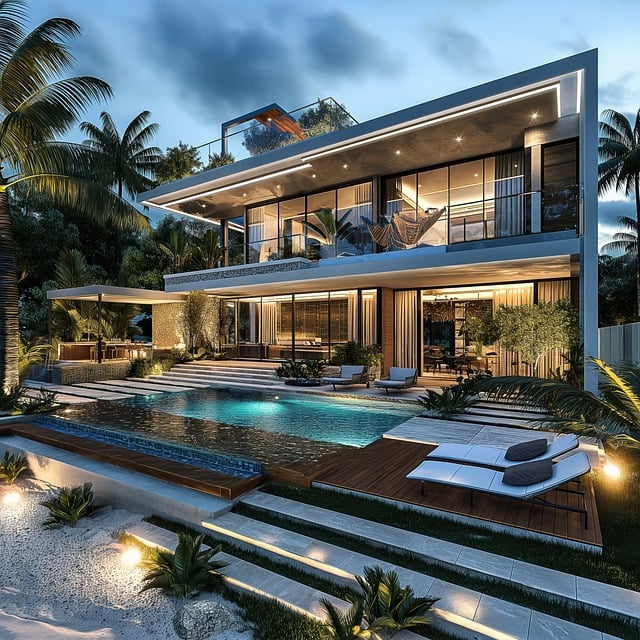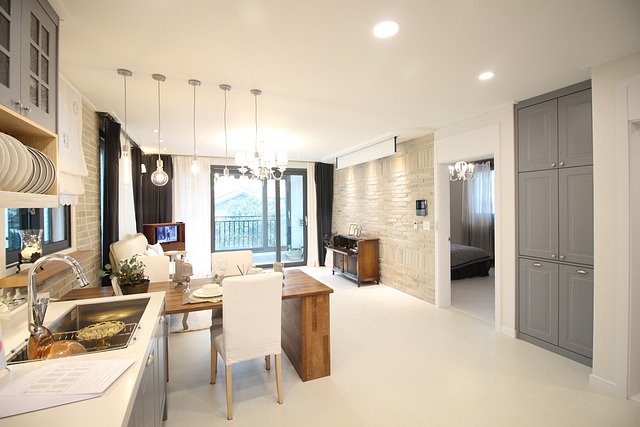navigating the Singaporean property landscape can be a complex endeavor, with two prominent options dominating the choices of homebuyers: Executive Condos (ECs) and HDB Flats. Both serve as cornerstones in the housing journey of many residents, offering distinct advantages and tailored to different eligibility criteria. This article delves into the intricacies of ECs versus HDB Flats, comparing their cost, CPF usage, loan options, resale value, and the lifestyle they promise. Understanding the unique aspects of each will empower you to make an informed decision that aligns with your financial standing and living aspirations. Whether you’re a first-time homeowner or an experienced property investor, this comparison will shed light on the practicalities and preferences involved in choosing between an Executive Condo and an HDB Flat.
- Understanding the Basics of Executive Condos (ECs) and HDB Flats
- Comparing the Eligibility Criteria for Executive Condos vs HDB Flats
- Financial Considerations: Cost, CPF Usage, and Loan Options for ECs and HDB Flats
- Resale Value and Market Trends for Executive Condos and HDB Flats
- Lifestyle and Living Experience: Amenities and Community Life in ECs vs HDB Estates
- Making the Decision: Factors to Consider When Choosing Between an Executive Condo and an HDB Flat
Understanding the Basics of Executive Condos (ECs) and HDB Flats

Executive Condos (ECs) and HDB flats serve as two key housing options for married couples and families in Singapore. An EC is a hybrid of both public and private housing designed to provide an upgrade path for eligible flat owners from public to private property. Eligibility for an EC hinges on the applicant being a Singaporean couple, where at least one applicant must not currently own or have disposed of a flat in the past 30 months. This makes ECs particularly appealing to those looking to upgrade from their HDB flat without having to wait for a resale flat.
HDB flats, on the other hand, are public housing provided by the Housing & Development Board (HDB), which is the government’s statutory board responsible for public housing. These flats are designed to be affordable and accessible to Singaporeans at various stages of life. Eligibility criteria for an HDB flat include being a Singaporean citizen, meeting the minimum occupancy period, and fulfilling the resale levy exemption or requirement, depending on one’s past housing ownership history. Both ECs and HDB flats come with their own set of benefits, with ECs offering a more premium living experience with higher ceiling heights, larger sizes, and often situated in mature estates with amenities. HDB flats are available in various types and sizes to suit different needs, from singles to multi-generational families, and are located across diverse neighborhoods island-wide. Understanding the differences between ECs and HDB flats is crucial for prospective homeowners as they navigate the eligibility requirements and housing options best suited to their lifestyle and financial situation.
Comparing the Eligibility Criteria for Executive Condos vs HDB Flats

When considering the housing options in Singapore, a prospective homeowner must navigate between the Housing & Development Board (HDB) flats and Executive Condos (ECs). Both types of residences cater to different segments of the market with distinct eligibility criteria that guide who can apply for each. Eligibility for an Executive Condo is tailored primarily for couples who may not qualify for a public housing flat yet, which includes Singapore citizens aged 21 and above, and have a combined household income not exceeding $14,000. At least one applicant must also have not owned or disposed of a HDB flat more than once in the preceding five years. This criterion is stricter compared to HDB flats, which are designed for a broader range of applicants including singles, families, and even second-timers who have previously owned a flat. The eligibility for an Executive Condo also mandates that individuals must first dispose of their HDB flat before they can purchase an EC, ensuring a more stable transition for upgraders. This differentiation in eligibility criteria is a strategic measure by the Singapore government to cater to the varying housing needs and aspirations within the community.
Financial Considerations: Cost, CPF Usage, and Loan Options for ECs and HDB Flats

When considering a residential property in Singapore, potential homeowners often find themselves weighing the options between an Executive Condominium (EC) and a Housing & Development Board (HDB) flat. Financial considerations play a pivotal role in this decision, with cost, CPF (Central Provident Fund) usage, and loan options being key factors to evaluate.
For starters, the eligibility for an Executive Condo is tailored for couples who meet the criteria set by the Housing & Development Board (HDB), which includes at least one Singaporean citizen. Unlike HDB flats, ECs are designed for upgraders with more financial flexibility, offering larger and more luxurious living spaces. The initial cost of an EC tends to be higher than that of a HDB flat, reflecting the difference in property size and amenities. However, HDB flats are generally more affordable and subsidized by the government, making them accessible to first-time homeowners and lower-income families.
In terms of CPF usage, both ECs and HDB flats can be fully financed by Singaporeans’ CPF savings, subject to the prevailing CPF loan limits. However, the loan terms differ: for an EC, you can use up to 90% of your CPF funds, while for a HDB flat, you may use up to 95% or even 100%, depending on the type of flat and the scheme you are under. This difference in loan eligibility within CPF funds is an important aspect of financial planning when choosing between an EC and a HDB flat.
As for loan options, both property types have similar financing avenues through bank loans or HDB loans. However, the loan-to-value (LTV) ratio and the maximum loan tenure may vary, influenced by the prevailing policies aimed at ensuring financial prudence among homeowners. It is crucial to assess these financial considerations against your personal income, savings, and long-term financial goals to determine which type of property aligns best with your needs and preferences.
Resale Value and Market Trends for Executive Condos and HDB Flats

When considering resale value and market trends, both Executive Condos (ECs) and Housing & Development Board (HDB) flats present unique opportunities and challenges for potential buyers. ECs are housing options for young couples or families that offer a more spacious and upscale living environment compared to traditional HDB flats. They are also a hybrid of both public and private housing, with the eligibility for an EC tied to specific criteria, such as income limits and being first-time flat owners under the age of 35 at the time of application.
The resale value of ECs can be particularly attractive due to their desirability as they are typically located in mature estates with comprehensive amenities. As these properties age, discerning buyers often find them to be a good investment, especially if they are well-maintained and situated in areas with strong market demand. Market trends for ECs tend to reflect broader economic indicators, with prices generally responding to changes in the overall property market, interest rates, and the supply of available units.
On the other hand, HDB flats are the most common form of housing in Singapore and offer a stable and affordable option for many residents. The resale value of HDB flats is influenced by factors such as location, flat type, age, and the condition of the property at resale. HDB resale prices are also affected by government policies aimed at ensuring affordability and stability within the public housing market. Market trends for HDB flats often reflect governmental priorities and broader societal shifts, such as population growth or demographic changes.
Prospective buyers should carefully consider these factors when deciding between an EC and an HDB flat, as both have their own set of advantages and challenges in terms of resale value and market trends. The eligibility for an EC is a key consideration for those looking to upgrade from an HDB flat, and understanding the nuances of each market is crucial for making an informed decision that aligns with one’s long-term housing and investment goals.
Lifestyle and Living Experience: Amenities and Community Life in ECs vs HDB Estates

Executive Condos (ECs) and Housing & Development Board (HDB) flats offer distinct living experiences that cater to different stages and preferences in life. For singles or couples who are looking to upgrade from a public housing flat, ECs represent an attractive alternative with a host of facilities and amenities designed for contemporary urban living. Eligibility for an Executive Condo is typically based on the income ceiling set by the CPF Board and includes at least one applicant who is a Singaporean citizen. Residents in ECs often have access to comprehensive condominium facilities such as swimming pools, gyms, BBQ pits, and function rooms, which are managed communally among residents. This not only enhances convenience but also fosters a vibrant community life where neighbours can socialize and engage in shared interests.
On the other hand, HDB estates, which cater to a broader spectrum of the population including singles, couples, families, and even the elderly, are designed with a strong emphasis on neighbourliness and community cohesion. These flats are situated close to amenities like supermarkets, wet markets, hawker centers, and community clubs that cater to daily needs. HDB estates often have their own set of shared facilities such as playgrounds, courts for various sports, and community gardens, which encourage communal activities and interactions. The focus here is on creating a living environment that nurtures the growth of a close-knit community where residents look out for one another, reflecting the ethos of inclusivity and shared responsibility within the public housing ecosystem. Both ECs and HDB flats offer their unique advantages in terms of lifestyle and living experience, with eligibility criteria guiding individuals to choose the right home that aligns with their current needs and future aspirations.
Making the Decision: Factors to Consider When Choosing Between an Executive Condo and an HDB Flat

